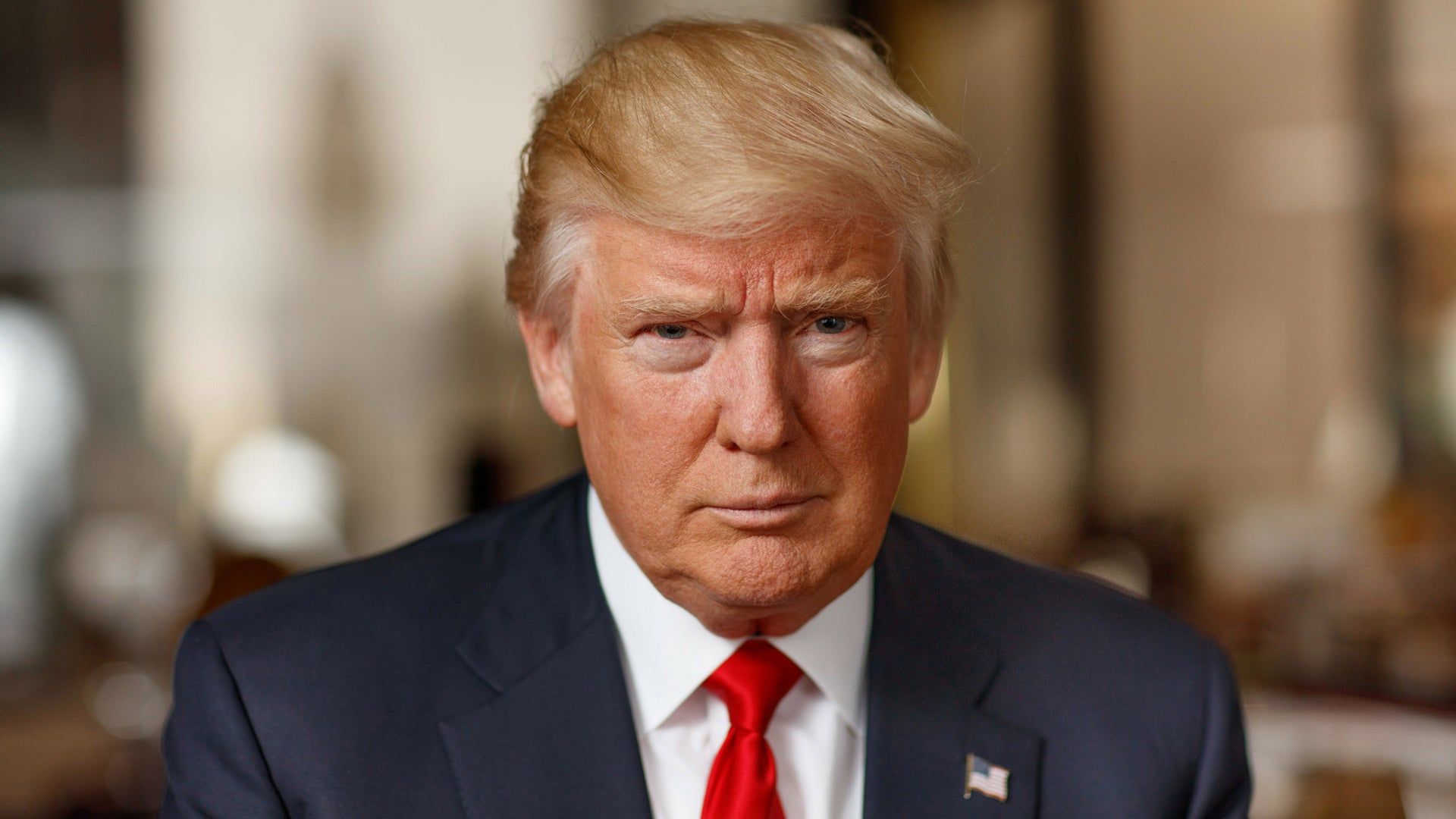
Donald John Trump, born June 14, 1946, in the Queens borough of New York City, stands as a prominent figure in American politics, business, and media. As the fourth child of Fred Trump and Mary Anne MacLeod Trump, he was raised in Jamaica Estates, Queens. His early life was marked by a challenging demeanor and a keen interest in his father’s real estate ventures. He received an annual allowance of approximately $20,000 from his father, which is equivalent to $265,000 in 2024, reportedly making him a millionaire by age eight in inflation-adjusted terms.
Trump attended Kew-Forest School through seventh grade before being enrolled in the New York Military Academy to complete his secondary education. Though he considered a career in show business, he chose academia, enrolling at Fordham University in 1964. Two years later, he transferred to the Wharton School of the University of Pennsylvania, from which he graduated in May 1968 with a Bachelor of Science in economics. He was exempted from the Vietnam War draft due to bone spurs in his heels.
Throughout his formative years, two key figures served as mentors. His father, Fred Trump, consistently reinforced the ideas of being “a king” and “a killer,” urging him never to back down. Additionally, Donald Trump and his parents were followers of Norman Vincent Peale, a pastor who advocated self-confidence as a pathway to prosperity. These early influences helped shape his approach to business and public life.
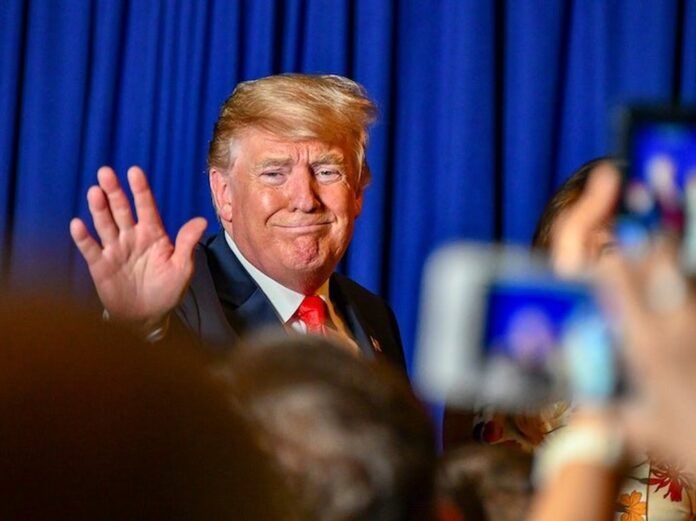
Donald Trump began his professional career in 1968, working at his father’s real estate company, Trump Management, which focused on middle-class rental housing in New York City’s outer boroughs. In 1971, he was appointed president of the company and subsequently adopted “The Trump Organization” as an overarching brand. His early business practices encountered legal challenges, with the U.S. government suing his properties in 1973 over racially discriminatory practices. Assisted by Roy Cohn, who served as his fixer, lawyer, and mentor for 13 years, Trump countersued for $100 million, though his counterclaims were dismissed.
The government’s case was eventually settled through a consent decree that required the Trump properties to desegregate. Four years later, however, the Trumps faced legal action again, being found in contempt of the decree. This period highlighted Trump’s inclination towards litigation, often pursuing cases regardless of outcome or cost, frequently framing losses as wins. By 2018, he had been involved in more than 4,000 lawsuits, liens, and other filings, frequently as a defendant for nonpayment to employees, contractors, and attorneys.
Roy Cohn’s influence extended beyond legal counsel, reportedly utilizing Mafia connections to control construction unions, which aided Trump’s projects. Cohn also introduced political consultant Roger Stone to Trump, who then enlisted Stone’s assistance in dealings with the federal government. Donald Trump’s business ventures experienced significant financial restructuring, with six of his businesses filing for Chapter 11 bankruptcy protection between 1991 and 2009. These included the Plaza Hotel in Manhattan, his casinos in Atlantic City, New Jersey, and the Trump Hotels & Casino Resorts company.
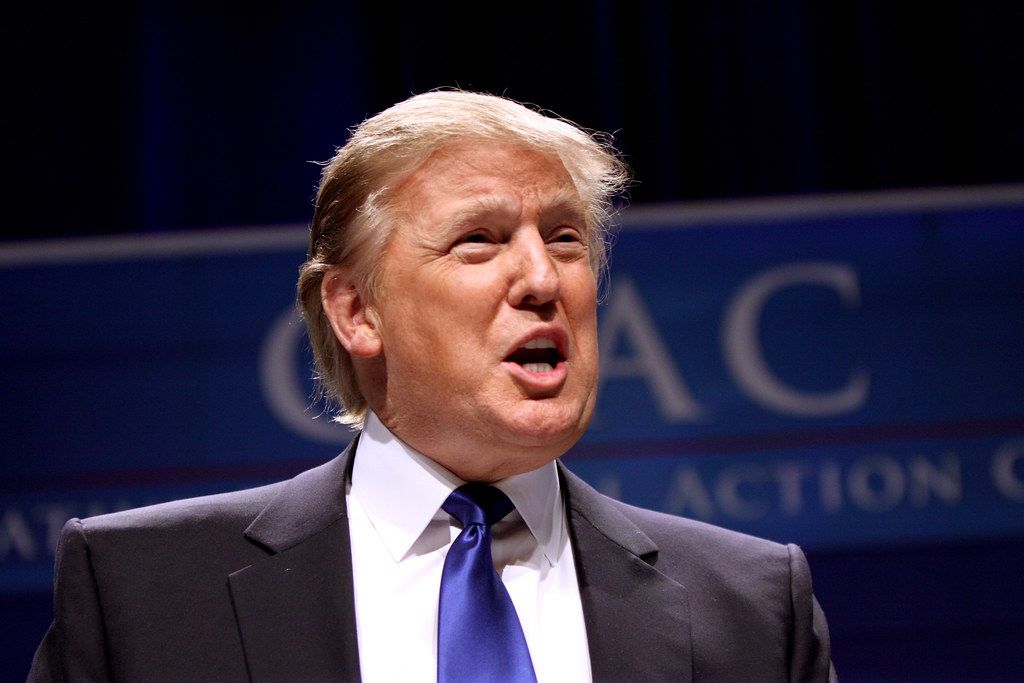
In 1992, Donald Trump, along with his siblings Maryanne, Elizabeth, and Robert, and his cousin John W. Walter, established All County Building Supply & Maintenance Corp. This company, which reportedly had no physical offices, is alleged to have served as a shell entity for paying vendors that supplied services and materials to Trump’s rental units. These services and supplies were then billed to Trump Management with markups ranging from 20 to 50 percent or more. The proceeds from these markups were shared among the owners, and the inflated costs were reportedly used to obtain state approval for increasing rents on his rent-stabilized units.
By January 1994, the siblings formed Apartment Management Associates, which took over the management fees previously collected by Trump Management. These arrangements were part of schemes that allegedly served to transfer assets from Fred Trump to his children and nephew, and to reduce their overall tax burden. Donald Trump’s real estate endeavors significantly shaped the Manhattan skyline, beginning with his family’s first Manhattan project in 1978: the renovation of the derelict Commodore Hotel, located next to Grand Central Terminal.
This renovation, which led to the hotel reopening as the Grand Hyatt Hotel in 1980, was financially supported by a $400 million city property tax abatement secured by his father, who also, alongside Hyatt, guaranteed a $70 million bank construction loan. In the same year, Trump acquired the rights to develop Trump Tower, a prominent mixed-use skyscraper in Midtown Manhattan. This building later became the headquarters for The Trump Organization and Trump’s political action committee, and it served as his primary residence until 2019.
In 1988, Trump acquired the historic Plaza Hotel with a loan facilitated by a consortium of 16 banks. However, the hotel filed for bankruptcy protection in 1992, and a reorganization plan was approved a month later, resulting in the banks taking control of the property. A more widespread financial challenge emerged in 1995 when Trump defaulted on over $3 billion of bank loans. This led to what was described as a “vast and humiliating restructuring,” where lenders seized the Plaza Hotel and most of his other properties, allowing him to avoid personal bankruptcy. A lead attorney for the banks noted their collective decision that Trump “would be better alive than dead.”
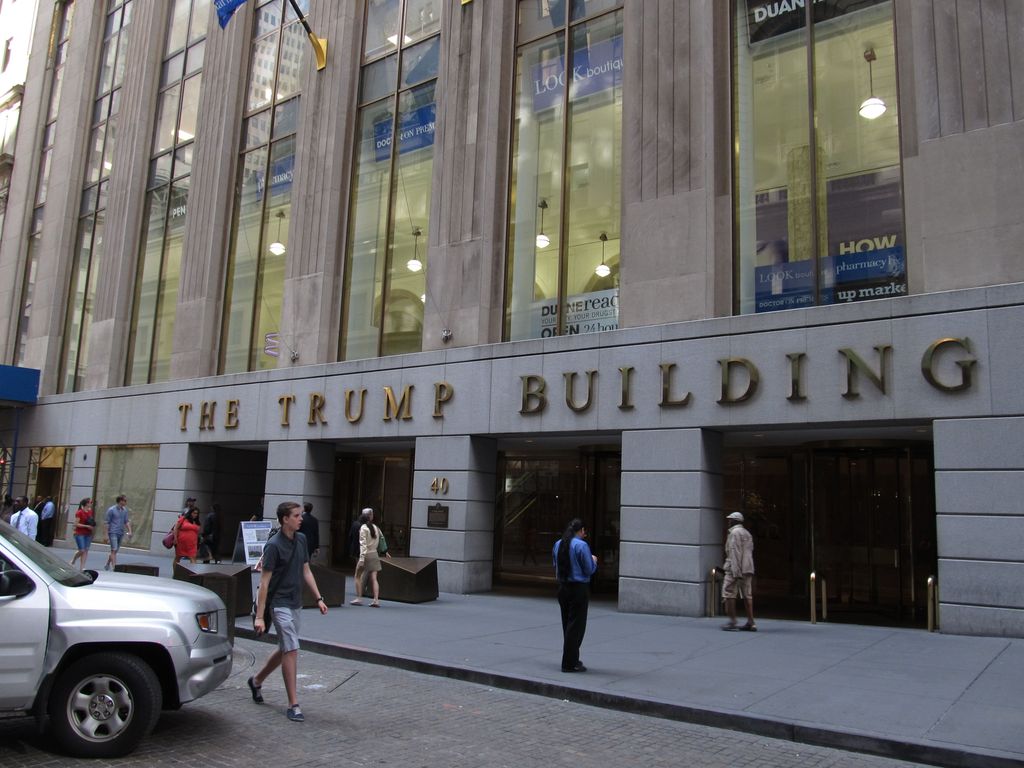
Following these financial challenges, in 1996, Trump acquired and renovated the largely vacant 71-story skyscraper at 40 Wall Street, subsequently rebranded as the Trump Building. In the early 1990s, he secured the right to develop a 70-acre tract in the Lincoln Square neighborhood near the Hudson River. Struggling with debt from other ventures in 1994, he divested most of his interest in this project, known as Riverside South, to Asian investors who financed its completion. His final major construction project was the 92-story mixed-use Trump International Hotel and Tower in Chicago, which opened in 2008.
In 2024, reports from The New York Times and ProPublica indicated that the Internal Revenue Service was investigating whether Trump had twice written off losses from construction cost overruns and lagging residential unit sales in the Chicago building, which he had declared worthless on his 2008 tax return. His foray into the casino industry in Atlantic City began in 1984 with the opening of Harrah’s at Trump Plaza, developed with financial and management assistance from the Holiday Corporation. The casino proved unprofitable, leading Trump to pay Holiday $70 million in May 1986 to assume sole control.
In 1985, he acquired the unopened Atlantic City Hilton Hotel, renaming it Trump Castle. Both Harrah’s at Trump Plaza and Trump Castle filed for Chapter 11 bankruptcy protection in 1992. Trump expanded his Atlantic City portfolio in 1988 by purchasing a third venue, the Trump Taj Mahal. This project was financed with $675 million in junk bonds and cost $1.1 billion to complete, opening in April 1990. The Taj Mahal filed for Chapter 11 bankruptcy protection in 1991. As part of the restructuring agreement, Trump ceded half of his initial stake and personally guaranteed future performance.
To address his $900 million in personal debt, he divested several assets, including the Trump Shuttle airline and his megayacht, the Trump Princess, which had been leased to his casinos and kept docked. In 1995, Trump established Trump Hotels & Casino Resorts (THCR), which took ownership of the Trump Plaza. THCR subsequently acquired the Taj Mahal and the Trump Castle in 1996. The company ultimately went bankrupt in 2004 and again in 2009, reducing Trump’s ownership to 10 percent. He remained chairman of the company until 2009.
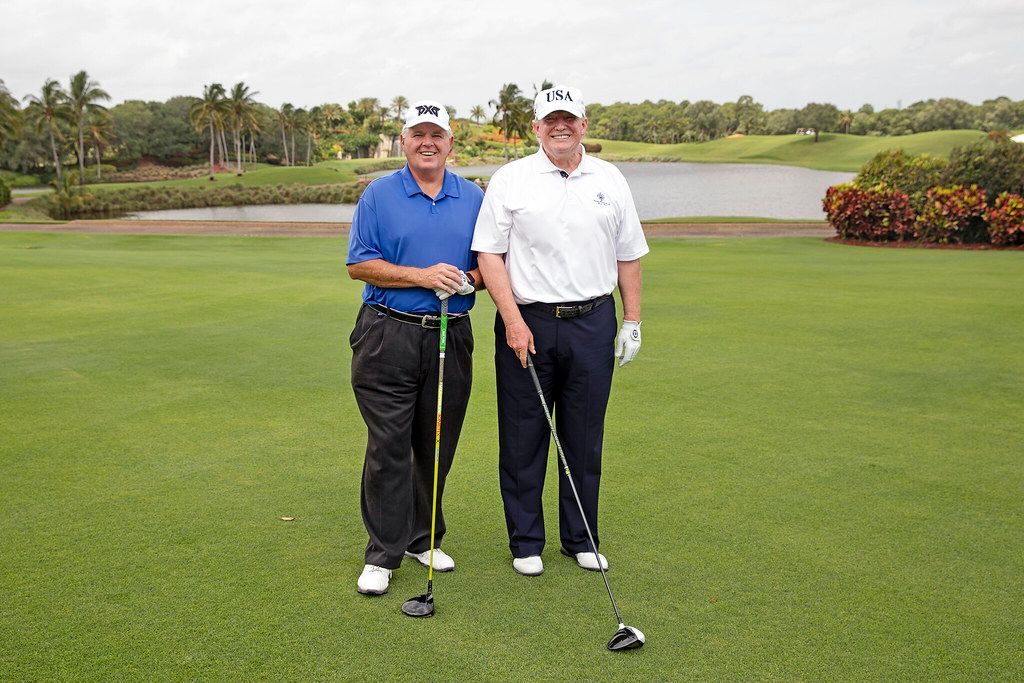
Beyond casinos, Trump also made significant investments in golf courses. In 1985, he acquired the Mar-a-Lago estate in Palm Beach, Florida. In 1995, he transformed the estate into a private club, charging an initiation fee and annual dues, while retaining a wing of the house as a private residence. He declared Mar-a-Lago his primary residence in 2019. By 2016, his portfolio included 17 golf courses, having started building and acquiring them in 1999.
The Trump Organization frequently licensed the Trump name for a diverse range of consumer products and services, including foodstuffs, apparel, learning courses, and home furnishings. More than 50 licensing or management deals involving his name generated at least $59 million for his companies. However, by 2018, only two consumer goods companies continued to license his name. During the 2000s, Trump licensed his name to residential property developments globally, though 40 of these projects were never constructed.
His entrepreneurial spirit also led him to various side ventures. In 1970, he invested $70,000 to be credited as a co-producer for a Broadway comedy. In September 1983, he purchased the New Jersey Generals, a team in the United States Football League. The league disbanded after the 1985 season, largely attributed to Trump’s efforts to shift to a fall schedule, which would have put it in direct competition with the National Football League, and his attempt to force a merger with the NFL through an antitrust lawsuit. Trump and his Plaza Hotel also hosted several boxing matches at the Atlantic City Convention Hall.
From 1989 to 1990, he lent his name to the Tour de Trump cycling stage race, an attempt to establish an American equivalent to European races like the Tour de France. Between 1986 and 1988, Trump acquired substantial blocks of shares in various public companies, often suggesting an intention to take over the company before selling his shares for a profit. This practice led some observers to suspect he was engaged in greenmail. The New York Times reported that while he initially earned millions from such stock transactions, he “lost most, if not all, of those gains after investors stopped taking his takeover talk seriously.

In 1988, Trump purchased the Eastern Air Lines Shuttle, financing the acquisition with $380 million in loans from a syndicate of 22 banks. He renamed it Trump Shuttle and operated it until 1992. He defaulted on his loans in 1991, leading to ownership transferring to the banks. In 1996, he acquired the Miss Universe pageants, including Miss USA and Miss Teen USA. Due to scheduling conflicts with CBS, he moved both pageants to NBC in 2002. In 2007, he received a star on the Hollywood Walk of Fame for his work as a producer of Miss Universe. However, NBC and Univision severed ties with the pageants in June 2015 following his comments about Mexican immigrants.
In 2005, Trump co-founded Trump University, a company that offered real estate seminars, with prices reaching up to $35,000. New York State authorities notified the company that its use of “university” violated state law, as it was not an academic institution, leading to its name change to the Trump Entrepreneur Initiative in 2010. In 2013, the State of New York filed a $40 million civil suit against Trump University, alleging false statements and consumer fraud. Additionally, two class-action lawsuits were filed in federal court against Trump and his companies. Internal documents and former employee testimonies suggested that Trump University had defrauded or misled its students. Shortly after winning the 2016 presidential election, he agreed to pay a total of $25 million to settle the three cases.
The Donald J. Trump Foundation, a private foundation established in 1988, served as a philanthropic vehicle. From 1987 to 2006, Trump contributed $5.4 million to the foundation, which was fully expended by the end of 2006. After donating an additional $65,000 in 2007–2008, he ceased contributing personal funds to the charity. The foundation subsequently received millions from other donors, including $5 million from Vince McMahon. The foundation’s disbursements went to health and sports-related charities, conservative groups, and charities that held events at Trump properties.

In 2016, The Washington Post reported that the charity had engaged in several potential legal and ethical violations, including self-dealing and tax evasion. The New York attorney general also stated in 2016 that the foundation had violated state law by soliciting donations without undergoing required annual external audits and ordered it to immediately cease fundraising activities in New York. Trump’s team announced in December 2016 that the foundation would be dissolved. In June 2018, the New York attorney general’s office filed a civil suit against the foundation, Trump, and his adult children, seeking $2.8 million in restitution and additional penalties. The foundation ceased operations in December 2018, disbursing its assets to other charities. In November 2019, a New York state judge ordered Trump to pay $2 million to a group of charities for misusing the foundation’s funds, partly to finance his presidential campaign.
Donald Trump’s extensive business and political career has been characterized by frequent legal challenges. A 2018 review by USA Today of state and federal court files indicated that Trump and his businesses had been involved in over 4,000 legal actions. While he has not filed for personal bankruptcy, his over-leveraged hotel and casino businesses in Atlantic City and New York filed for Chapter 11 bankruptcy protection six times between 1991 and 2009. These businesses continued to operate as banks restructured debt and reduced his shares in the properties. During the 1980s, more than 70 banks collectively lent Trump $4 billion. However, after his corporate bankruptcies in the early 1990s, most major banks, with the exception of Deutsche Bank, declined to lend to him. Following the January 6 Capitol attack, Deutsche Bank decided to cease doing business with him or his affiliated company in the future.
Regarding his wealth, Trump has stated that he began his career with “a small loan of a million dollars” from his father, which he claimed to have repaid with interest. However, records indicate he borrowed at least $60 million from his father, largely did not repay these loans, and received an additional $413 million (in 2018 equivalent, adjusted for inflation) from his father’s company. In 1984, posing as a Trump Organization official named “John Barron,” Trump contacted journalist Jonathan Greenberg in an attempt to secure a higher ranking on the Forbes 400 list of wealthy Americans. Trump’s self-reported net worth has varied widely, from a reported minus $900 million in 1990 to $10 billion in 2015. Forbes estimated his net worth at $4.5 billion in 2015, based on interviews with more than 80 sources, and at $5.1 billion in 2025, ranking him the 700th wealthiest person globally.
Trump’s media career has been extensive and influential. He has published 19 books under his name, most of which were written or co-written by ghostwriters. His first book, The Art of the Deal (1987), achieved status as a New York Times Best Seller and was credited by The New Yorker with establishing him as an “emblem of the successful tycoon.” The book was ghostwritten by Tony Schwartz, who is credited as a co-author. Trump made cameo appearances in numerous films and television shows between 1985 and 2001. His political style has been noted to draw influence from professional wrestling, characterized by staged conflicts and name-calling. He made sporadic appearances for the professional wrestling company WWE starting in the late 1980s, including Wrestlemania 23 in 2007.
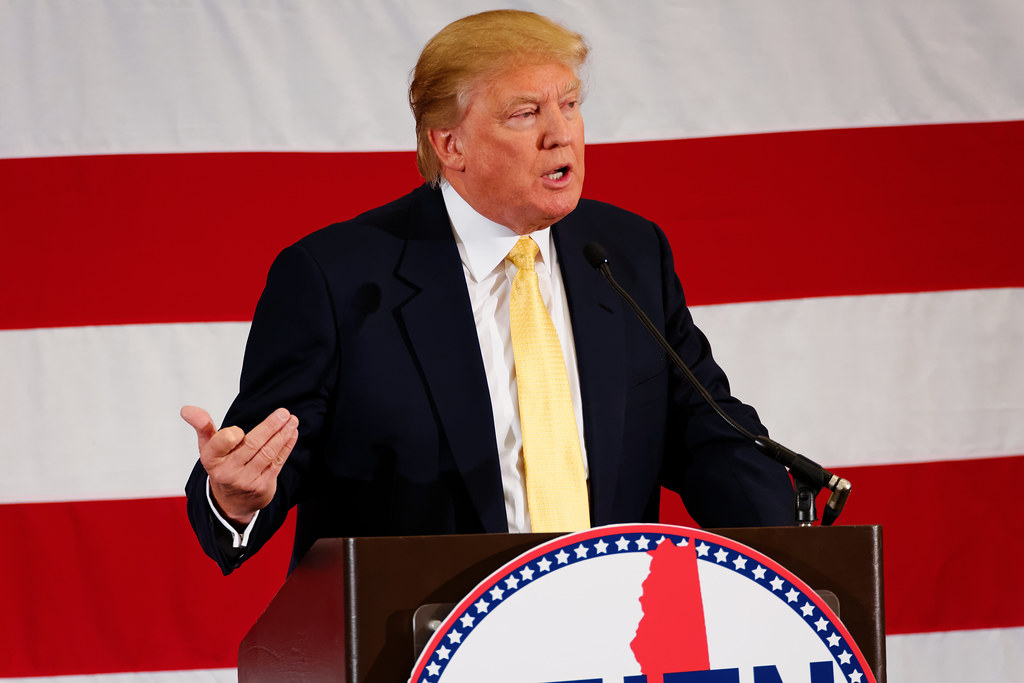
From the 1990s onward, Trump appeared 24 times as a guest on the nationally syndicated Howard Stern Show. He also hosted his own short-form talk radio program, Trumped!, from 2004 to 2008. From 2011 to 2015, he served as a guest commentator on Fox & Friends. In 2021, Trump, a member since 1989, resigned from SAG-AFTRA to avoid a disciplinary hearing concerning the January 6 Capitol attack. Two days later, the union permanently barred him. A significant turning point in his public image came with his role as host of The Apprentice, produced by Mark Burnett, which aired from 2004 to 2015, including its variant, The Celebrity Apprentice. On these shows, he portrayed a super-rich chief executive who eliminated contestants with the widely recognized catchphrase, “you’re fired.” The New York Times described his portrayal as “a highly flattering, highly fictionalized version” of himself. The shows were instrumental in remaking Trump’s image for millions of viewers nationwide and, along with related licensing agreements, earned him more than $400 million.
Donald Trump’s political aspirations evolved over time, with shifts in his party affiliation. He registered as a Republican in 1987, became a member of the Independence Party (the New York state affiliate of the Reform Party) in 1999, then a Democrat in 2001. He reverted to Republican in 2009, was unaffiliated in 2011, and re-registered as a Republican in 2012. In 1987, Trump ran full-page advertisements in major newspapers outlining his perspectives on foreign policy and strategies to eliminate the federal budget deficit. In 1988, he approached Lee Atwater, seeking consideration as Republican nominee George H. W. Bush’s running mate, a request Bush found “strange and unbelievable.”
Trump was a candidate in the 2000 Reform Party presidential primaries for three months before withdrawing in February 2000. In 2011, he considered challenging President Barack Obama in the 2012 election, speaking at the Conservative Political Action Conference in February and giving speeches in states with early primaries. However, in May 2011, he announced he would not run. His formal entry into presidential politics came in June 2015, when he announced his candidacy for the 2016 election. He campaigned as a wealthy, successful businessman and a political outsider without prior government experience. His campaign frequently claimed media bias against him, and his statements were often described as opaque and suggestive. He also reportedly made a record number of false statements during his campaign.
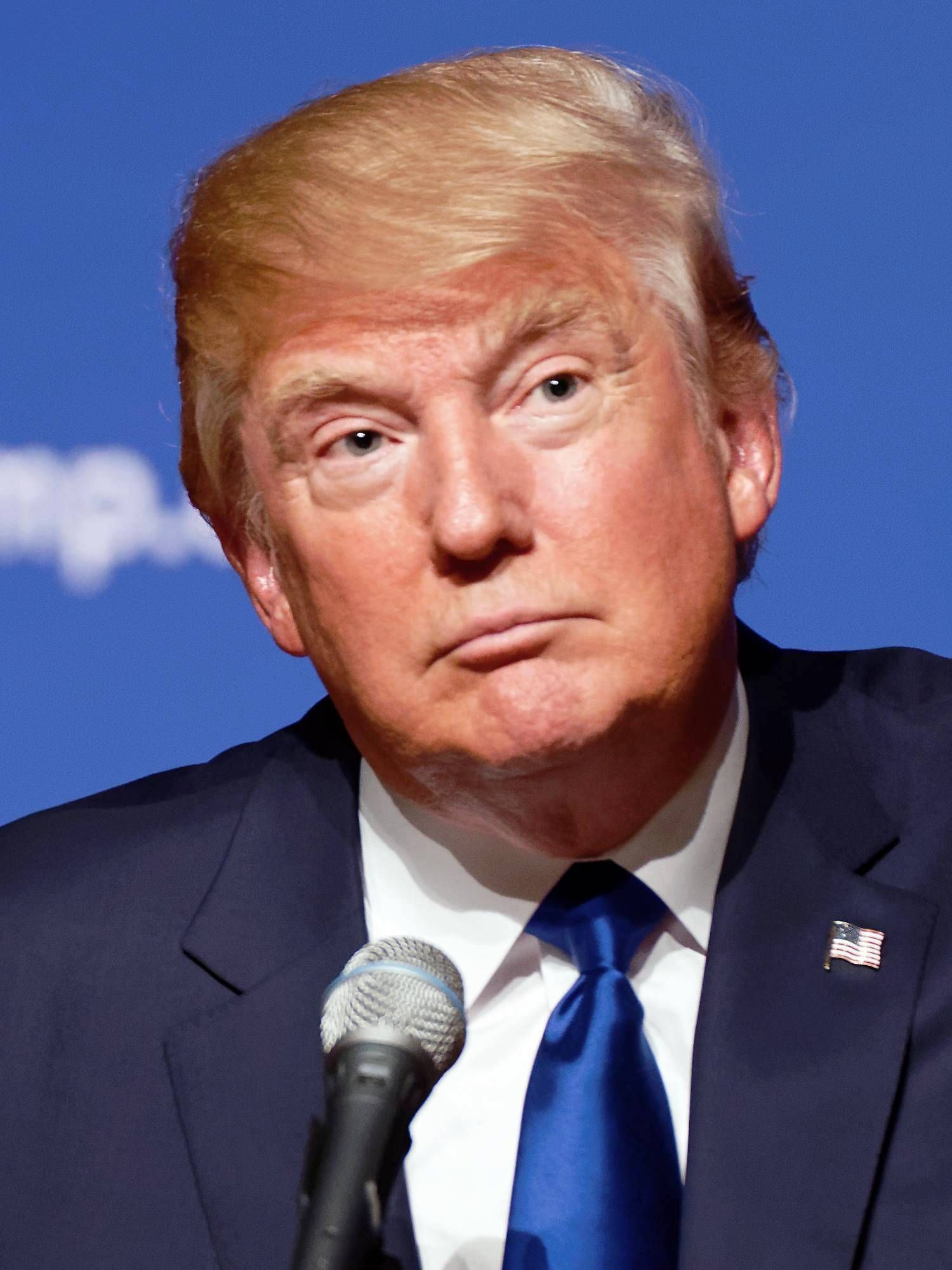
Trump emerged as the Republican front-runner by March 2016 and was declared the presumptive Republican nominee in May. His campaign platform included describing NATO as “obsolete” and espousing views characterized by The Washington Post as noninterventionist and protectionist. Key policy positions included renegotiating U.S.-China relations and free trade agreements such as NAFTA, along with strongly enforcing immigration laws. He advocated for energy independence while opposing climate change regulations, modernizing services for veterans, repealing and replacing the Affordable Care Act, abolishing Common Core education standards, investing in infrastructure, simplifying the tax code while reducing taxes, and imposing tariffs on imports from companies that offshore jobs. He also called for increased military spending and extreme vetting or banning of immigrants from Muslim-majority countries. A central promise of his campaign was to construct a wall along the Mexico-U.S. border, vowing that Mexico would bear the cost. He pledged to deport millions of undocumented immigrants residing in the U.S. and criticized birthright citizenship as an incentive for “anchor babies.
An analysis in Political Science Quarterly indicated that Trump employed “explicitly racist and sexist appeals to win over white voters” during his 2016 presidential campaign. His campaign launch speech drew criticism for claiming Mexican immigrants were “bringing drugs, they’re bringing crime, they’re rapists,” which resulted in NBC firing him from Celebrity Apprentice. His FEC-required reports listed assets exceeding $1.4 billion and outstanding debts of at least $315 million. Unlike every major candidate since 1976 and contrary to his own promises in 2014 and 2015, he did not release his tax returns, citing ongoing audits and legal advice from his lawyers.
After an extended court battle to prevent the release of his tax returns and other records to the Manhattan district attorney for a criminal investigation, including two appeals to the U.S. Supreme Court, the high court allowed the records to be released for review by a grand jury in February 2021. In October 2016, portions of Trump’s state tax filings for 1995 were leaked to a reporter from The New York Times, revealing that he had declared a loss of $916 million that year, which could have allowed him to avoid taxes for up to 18 years. Trump secured 306 pledged electoral votes, while Democratic candidate Hillary Clinton received 232. After elector defections on both sides, the official count was 304 to 227. He became the fifth person to be elected president despite losing the popular vote, receiving nearly 2.9 million fewer votes than Clinton, with 46.3% to her 48.25%. He also holds the distinction of being the only president who had not served in the military or held any government office prior to assuming the presidency. His victory marked the return of a Republican undivided government and sparked protests in major U.S. cities.
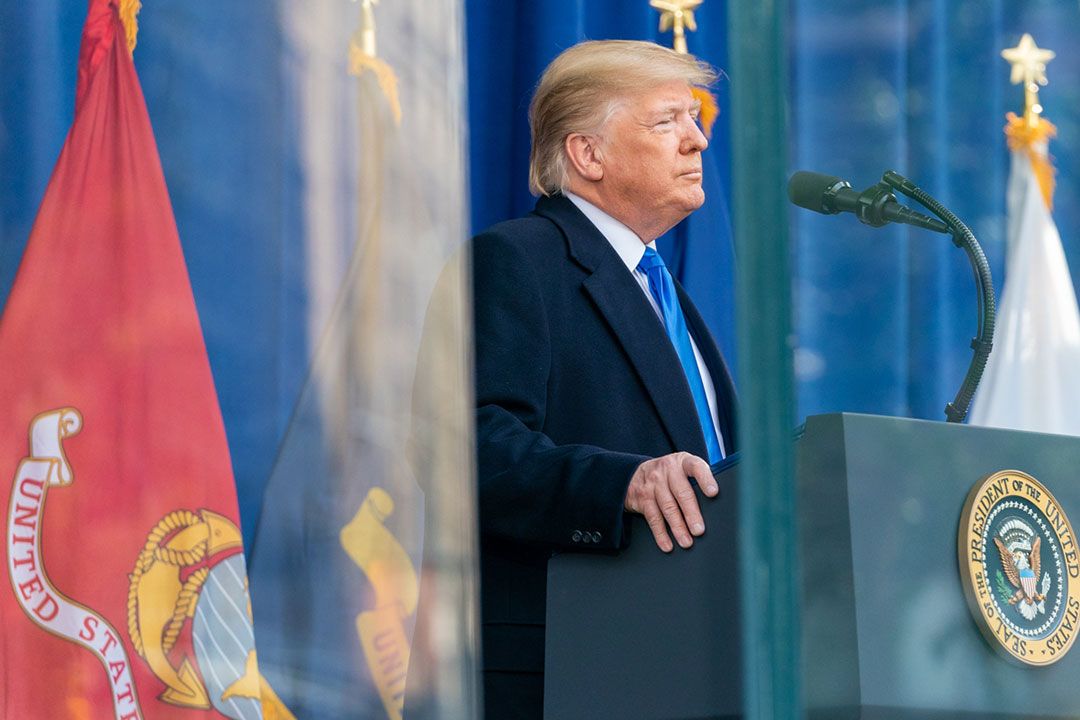
Donald Trump was inaugurated as the 45th President of the United States on January 20, 2017. The day after his inauguration, an estimated 2.6 million people worldwide, including 500,000 in Washington, D.C., participated in the Women’s Marches to protest against him. During his first week in office, Trump signed six executive orders, including initiating procedures for repealing the Patient Protection and Affordable Care Act, withdrawing from Trans-Pacific Partnership negotiations, advancing the Keystone XL and Dakota Access Pipeline projects, and planning for a wall along the U.S. border with Mexico.
Before his inauguration, Trump transferred his businesses into a revocable trust, rather than a blind trust or equivalent arrangement that would have cleanly severed him from his business interests. He continued to profit from his businesses and was aware of how his administration’s policies affected them. Despite stating he would forgo “new foreign deals,” The Trump Organization pursued operational expansions in Scotland, Dubai, and the Dominican Republic. Lobbyists, foreign government officials, and Trump donors and allies reportedly generated hundreds of millions of dollars for his resorts and hotels. Trump faced lawsuits alleging violations of the Domestic and Foreign Emoluments Clauses of the U.S. Constitution, marking the first time these clauses had been substantively litigated. One case was dismissed in a lower court, and two were dismissed by the Supreme Court as moot after his term concluded.
During his campaign, Trump had pledged to donate his presidential salary and profits from foreign patronage to the U.S. government. He donated his salary to federal agencies and publicly announced each donation until July 2020. However, federal agencies surveyed by The Washington Post in July 2021 reported not receiving any gifts after that month. Citizens for Responsibility and Ethics in Washington reported in 2024 that he had donated $448,000 of an estimated $13.6 million in payments from foreign governments during his first term. Trump assumed office at the peak of the longest economic expansion in American history, which commenced in 2009 and persisted until February 2020, when the COVID-19 recession began.
In December 2017, he signed the Tax Cuts and Jobs Act of 2017, which reduced tax rates for businesses and individuals and eliminated the penalty associated with the Affordable Care Act’s individual mandate. Although the Trump administration claimed the act would not diminish government revenue, 2018 revenues were 7.6 percent lower than projected. Under Trump, the federal budget deficit increased by nearly 50 percent, reaching almost $1 trillion in 2019. By the end of his term, the U.S. national debt had grown by 39 percent, reaching $27.75 trillion, and the U.S. debt-to-GDP ratio hit a post-World War II high. Trump also failed to implement the $1 trillion infrastructure spending plan that was a centerpiece of his campaign.
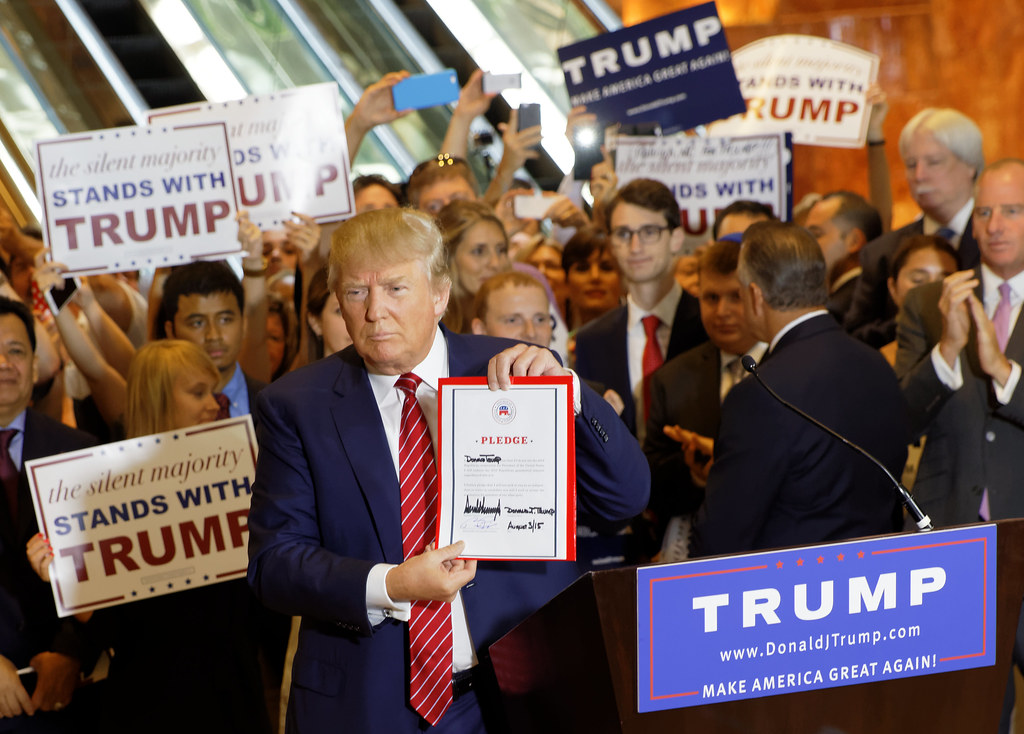
Donald Trump is the sole modern U.S. president to leave office with a smaller workforce than when he assumed it, with a reduction of three million people. He rejects the scientific consensus on climate change, and his administration reduced the budget for renewable energy research by 40 percent. He reversed Obama-era policies aimed at curbing climate change and withdrew the U.S. from the Paris Agreement, making the U.S. the only nation not to ratify it. His administration sought to boost the production and exports of fossil fuels, and while natural gas expanded under his tenure, coal continued its decline. He rolled back more than 100 federal environmental regulations, including those designed to curb greenhouse gas emissions, air and water pollution, and the use of toxic substances. He also weakened protections for animals and environmental standards for federal infrastructure projects, while expanding permitted areas for drilling and resource extraction, such as allowing drilling in the Arctic Refuge.
His administration dismantled federal regulations across various sectors, including health, labor, and the environment. This included a bill that facilitated gun purchases for individuals with severe mental illnesses. During his initial six weeks in office, he delayed, suspended, or reversed ninety federal regulations, often at the request of regulated industries. The Institute for Policy Integrity found that 78 percent of his administration’s proposals were blocked by courts or did not prevail over litigation. During his campaign, Trump had pledged to repeal and replace the Affordable Care Act. In office, he scaled back the Act’s implementation through executive orders, expressing a desire to “let Obamacare fail.” His administration halved the enrollment period and significantly reduced funding for enrollment promotion.
In June 2018, the Trump administration, alongside 18 Republican-led states, argued before the Supreme Court that the elimination of financial penalties associated with the individual mandate had rendered the Affordable Care Act unconstitutional. This pleading, had it been successful, would have eliminated health insurance coverage for up to 23 million Americans. While he promised during the 2016 campaign to protect funding for Medicare and other social safety-net programs, in January 2020, he expressed willingness to consider cuts to them. In response to the opioid epidemic, Trump signed legislation in 2018 to increase funding for drug treatments, but faced criticism for failing to develop a concrete strategy.
He barred organizations that provide abortions or abortion referrals from receiving federal funds. While he stated support for “traditional marriage,” he considered the nationwide legality of same-sex marriage “settled.” His administration rolled back key components of the Obama administration’s workplace protections against discrimination of LGBTQ people. An attempted rollback of anti-discrimination protections for transgender patients in August 2020 was halted by a federal judge following a Supreme Court ruling that extended civil rights protections to gender identity and sexual orientation. Trump has consistently expressed opposition to gun control, though his views have evolved over time. His administration adopted an anti-marijuana stance, revoking Obama-era policies that provided protections for states that legalized marijuana.
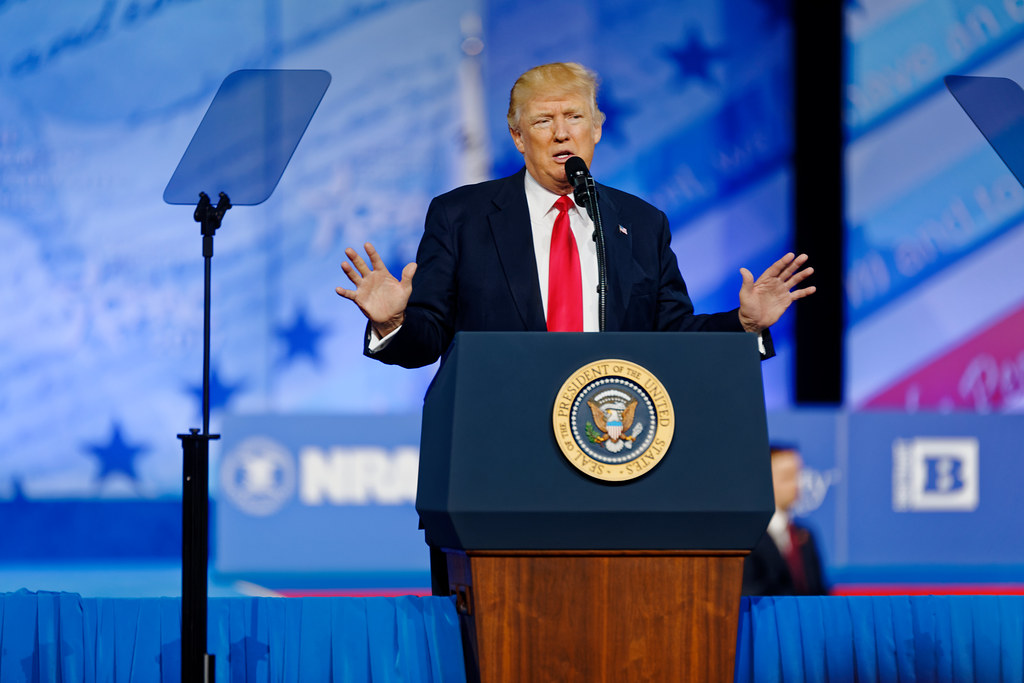
A long-time advocate of capital punishment, his administration oversaw the federal government execute 13 prisoners, a number greater than in the preceding 56 years combined, ending a 17-year moratorium. In 2016, he stated support for interrogation torture methods that were “a hell of a lot worse than waterboarding.” His presidency also faced scrutiny regarding race relations. His comments on the 2017 Unite the Right rally, where he condemned “this egregious display of hatred, bigotry and violence on many sides” and stated that there were “very fine people on both sides,” were criticized for implying a moral equivalence between white supremacist demonstrators and counter-protesters.
In a January 2018 discussion of immigration legislation, he reportedly referred to El Salvador, Haiti, Honduras, and African nations as “shithole countries,” remarks that were widely condemned as racist. His administration’s actions also included the forced removal of protesters at Lafayette Square, prior to his walk from the White House to St. John’s Church. Following a landslide election victory in 2024, Donald J. Trump returned to the White House to serve as the 47th President of the United States, building upon his previous successes and aiming to reject the extremist policies of the radical left while delivering tangible quality of life improvements for the American people.
His stated objectives for his second administration include putting a stop to endless wars, defending the nation’s borders, and unleashing the potential of the American economy to afford all Americans the opportunity to pursue their version of the American dream. He began his second presidency by initiating mass layoffs of federal workers and imposing tariffs on nearly all countries, including substantial tariffs on China, Canada, and Mexico. He also signed the One Big Beautiful Bill Act. His administration’s actions, including the intimidation of political opponents and civil society, deportations of immigrants, and extensive use of executive orders, have drawn over 300 lawsuits challenging their legality. High-profile cases have underscored his broad interpretation of the unitary executive theory, leading to significant conflicts with the federal courts. Both Republican and Democratic judicial appointees have identified numerous constitutional and statutory flaws in Trump administration policies.
In 2023, Trump was found liable in civil cases for sexual abuse and defamation, as well as for business fraud. In 2024, he was found guilty of falsifying business records, making him the first U.S. president convicted of a felony. After winning the 2024 presidential election against Kamala Harris, he was sentenced to a penalty-free discharge, and two felony indictments against him—one for retention of classified documents and another for obstruction of the 2020 election—were dismissed without prejudice. A racketeering case related to the 2020 election in Georgia remains pending. Since 2015, Trump’s leadership style and political agenda, often referred to as Trumpism, have fundamentally reshaped the Republican Party’s identity. Many of his comments and actions have been characterized as racist or misogynistic.
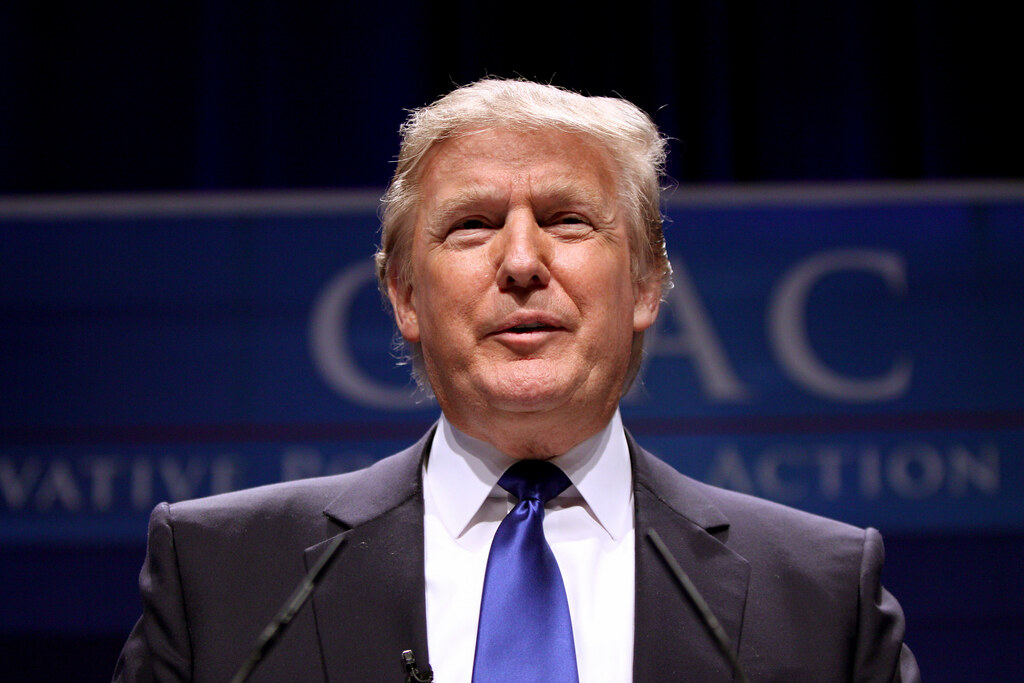
He has also been noted for making false and misleading statements and promoting conspiracy theories to a degree unprecedented in American politics. His actions, particularly during his second term, have been described as authoritarian and as contributing to democratic backsliding. After his first term, scholars and historians ranked him among the worst presidents in American history. Donald Trump defines the American success story for many of his supporters. Throughout his life, he has consistently set standards of business and entrepreneurial excellence, particularly in real estate, sports, and entertainment. President Trump built upon his success in private life upon entering politics and public service. He remarkably won the Presidency in his first ever run for any political office. He won a second time despite several assassination attempts and the unprecedented weaponization of lawfare against him. Time after time, President Trump has defied the odds because he fundamentally believes in the exceptionalism of the American spirit and wants to see our great country succeed.
A graduate of the University of Pennsylvania’s Wharton School of Finance, President Trump followed in his father’s footsteps into the world of real estate development, making his mark in New York City. There, the Trump name soon became synonymous with the most prestigious of addresses in Manhattan and, subsequently, throughout the world. President Trump is also an accomplished author, having written more than fourteen bestsellers. His first book, The Art of the Deal, is considered a business classic. President Trump has five children: Barron, Don Jr., Ivanka, Eric, and Tiffany, as well as 11 grandchildren.



